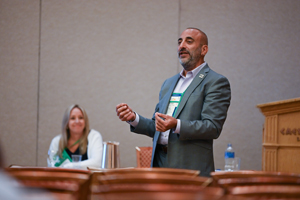
by Monterey Sims, Director, Admissions and Evaluation, University of Phoenix
On Sunday AACRAO Speede Committee and Postsecondary Electronic Standards Council (PESC) hosted a session titled “The Next Big Jump in Technology and Standards.” Session presenters included: Doug Holmes (Ontario Universities' Application Centre), Jeff Elliott (University of Missouri System), Matt Bemis (University of Southern California), Michael Sessa (PESC), and Monterey Sims (University of Phoenix).
Presenters explained how some new technology and standards on the horizon are paving the way for additional efficiencies which will increase interoperability and support student mobility while reinforcing security and efficiency for our students and institutions. Topics included JSON, (JavaScript Object Notation), EdExchange, GEO Code, and the Canada-wide eTranscript initiative.
JSON is text format like XML that could be used to exchange education data. There is now a PESC XML compliant JSON 1.0 available.
EdExchange is neutral platform for data exchange (Platform as-a-Service PaaS) which enables a digital lookup of senders/receivers of education records. It will inform routing instructions and preferred exchange formats for peer to peer electronic record and data exchange. The idea is being discussed amount groups in both the US and abroad and several successful pilots have already been completed.
GEO Code was an idea born out of a need to have a unique identifier for every postsecondary institution on the planet. Many code sets exist (CEEB, DUNS, FICE, IPEDS, OPEID, etc.) but none were complete, and most were considered a regional or country-based index. GEO Code is maintained, updated and provided for use at NO COST to the education community.
Canadian institutions have taking on some major improvement initiatives over the past several years which are aimed at advancing student mobility through trusted data exchange. Through major collaboration efforts across all provinces and inclusion of other international partners Canada is doing amazing work to coordinate their exchange networks across the country and considering how GEO Code, EdExchange or other initiatives can be leveraged along with their current work to improve and support student mobility both inside and outside Canada.
Learn more…
GEO Code: https://geocode.pesc.org/
EdExchange: https://www.pesc.org/edexchange-user-group.html
PESC Compliant JSON: https://www.pesc.org/json-ld-task-force-1.html
Canadian PESC User Group: https://www.pesc.org/canadian-pesc-user-group.html
ARUCC Student Mobility Project: https://arucc.ca/en/
Social Mobility: https://www.arucc.ca/uploads/Groningen/Groningen_2019/Social_Mobility_Business_Case_Page/Social_mobility_brochure_2019_04_29.pdf
Basic Guide to Electronic Data Exchange: https://community.aacrao.org/CPBase__item?id=a1H1V000005MHtaUAG